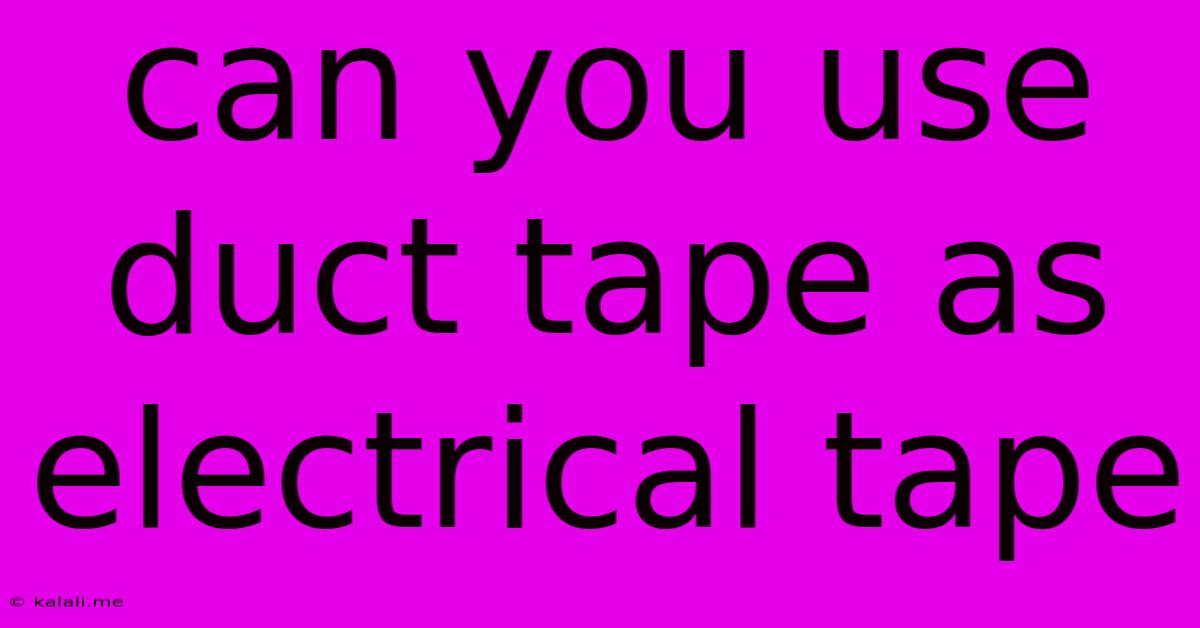Can You Use Duct Tape As Electrical Tape
Kalali
May 31, 2025 · 3 min read

Table of Contents
Can You Use Duct Tape as Electrical Tape? A Comprehensive Guide
Meta Description: Is duct tape a viable substitute for electrical tape? This guide explores the safety risks, effectiveness, and situations where using duct tape on electrical wires might be considered (though generally discouraged). Learn the crucial differences and why electrical tape is always the preferred option.
Duct tape is a remarkably versatile material, known for its strong adhesive and ability to stick to almost anything. This raises a common question: can you use duct tape as electrical tape? The short answer is: no, you should not use duct tape as a substitute for electrical tape. While duct tape might seem like a quick fix in a pinch, using it on exposed wires presents significant safety risks.
Why Duct Tape is NOT Suitable for Electrical Work
Electrical tape is specifically designed for electrical applications. It's formulated with several key features that duct tape lacks:
-
Insulation: Electrical tape provides superior insulation, preventing electrical shocks and short circuits. Duct tape, while adhesive, offers significantly less insulation and may not effectively prevent current leakage.
-
Heat Resistance: Electrical connections can generate heat. Electrical tape is designed to withstand this heat without melting or losing its insulating properties. Duct tape, on the other hand, can melt or become brittle under heat, compromising its effectiveness and potentially causing a fire hazard.
-
Flexibility and Conformability: Electrical tape is flexible and conforms easily to the shape of wires and connections, ensuring a secure and consistent seal. Duct tape, while somewhat flexible, is less conformable and may leave gaps in insulation.
-
Dielectric Strength: Electrical tape boasts high dielectric strength, meaning it can resist the passage of electrical current. Duct tape lacks this crucial property, increasing the risk of electric shock.
When (and Why) Duct Tape Should Be Avoided Around Electricity
Even in seemingly minor situations, using duct tape on electrical wires is unwise. Consider these scenarios:
-
Temporary Fixes: While tempting for a quick solution, a temporary fix with duct tape can lead to more serious problems down the line. The inadequate insulation can cause fires or shocks. Always opt for a proper repair with electrical tape or by calling an electrician.
-
Emergency Situations: In a true emergency, your priority should be safety, not a quick fix. If you encounter a dangerous electrical situation, turn off the power at the breaker box or fuse box before attempting any repair. Never handle exposed wires unless you are trained and equipped to do so safely.
-
Outdoor Applications: Exposure to the elements weakens duct tape's already limited insulating qualities. Moisture can easily penetrate duct tape, increasing the risk of electrical hazards.
What to Use Instead: The Importance of Electrical Tape
Electrical tape is inexpensive and readily available at most hardware stores. Its superior insulation, heat resistance, and flexibility make it essential for any electrical repair or connection. Always prioritize safety and use the correct tools and materials for the job.
Conclusion: Prioritize Safety
While duct tape's versatility is undeniable, using it as a substitute for electrical tape is incredibly risky and should be avoided at all costs. The potential for electrical shocks, fires, and other hazards far outweighs any perceived convenience. Always use appropriate electrical tape for electrical work and consult a qualified electrician if you're unsure about any repair. Remember, safety should always come first.
Latest Posts
Latest Posts
-
Jingle Bells Batman Smells Robin Laid An Egg
Jun 02, 2025
-
What Is A Bad Beat Pot
Jun 02, 2025
-
How To Tune A Bass Guitar
Jun 02, 2025
-
How To Install Smbclient On Linux
Jun 02, 2025
-
What Is A Bishop In A Black Church
Jun 02, 2025
Related Post
Thank you for visiting our website which covers about Can You Use Duct Tape As Electrical Tape . We hope the information provided has been useful to you. Feel free to contact us if you have any questions or need further assistance. See you next time and don't miss to bookmark.